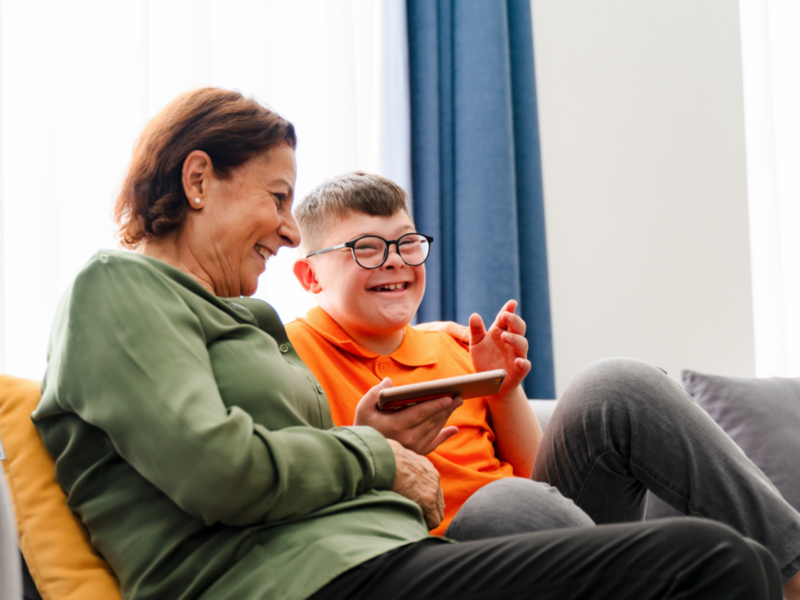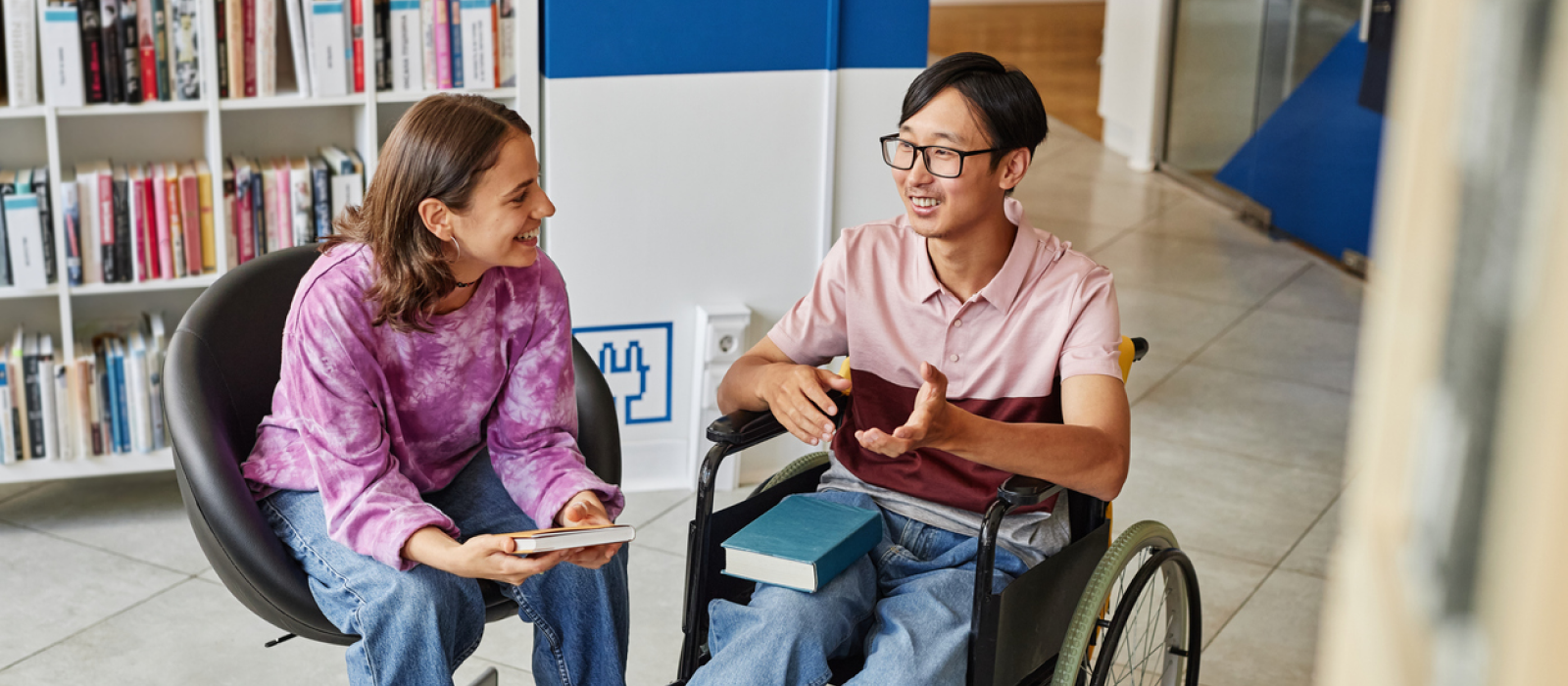
Honoring International Day of Persons with Disabilities: The Intersection of Disabilities and Mental Health
Written By: Charlie Health Editorial Team

Clinically Reviewed By: Dr. Don Gasparini
Updated: December 1, 2023
6 min.
Learn more about the history and significance of the annual day and where mental health fits into the conversation about disabilities.
Learn more about our Clinical Review Process
December 3rd marks International Day of Persons with Disabilities (IDPD), a day designated by the United Nations (UN) to raise awareness about disability issues and gather support for the rights and well-being of people with disabilities. It is one of many instances during the year to celebrate people with disabilities, including Disability Pride Month in July.
Historically, people with disabilities have faced stigma and mistreatment resulting in the denial of rights, inadequate care, and unfair treatment from both individuals and institutions. IDPD aims to address this issue with education and advocacy. Keep reading to learn about the history and significance of IDPD, this year’s annual theme, and where mental health fits into the conversation about disabilities.

Ability and disability shouldn’t define your access to care
See how we’re making intensive mental healthcare accessible to everyone
What is International Day of Persons with Disabilities?
IDPD was established in 1992 as a continuation of the momentum generated during the UN Decade of Disabled Persons, which took place during the preceding decade. The decade drew attention to issues related to disability, promoted equal opportunities for people with disabilities, and emphasized the need for societal changes and legislative actions to address the challenges faced by people with disabilities globally. The day, by extension, emphasizes the importance of creating an inclusive and accessible society where people with disabilities can fully participate in various aspects of life—an ongoing process. IDPD emphasizes that disability rights are part of the human rights that everyone—in the United States and globally—deserves.
Each year, there is a specific theme to focus on different aspects of disability rights and inclusion. The 2023 theme for IDPD is “United in action to rescue and achieve the Sustainable Development Goals for, with, and by persons with disabilities.” Sustainable Development Goals (SDGs) are 17 global objectives set by the UN to make the world more sustainable and fair by 2030, including good health, reduced inequality, climate action, and more. The timely achievement of these goals, though, is at risk, and preliminary UN findings show that progress on goals for people with disabilities is even more behind schedule. This year’s IDPD theme aims to raise awareness of this issue and speed up efforts to achieve SDGs for those with disabilities—a community that has been historically marginalized and left far behind in progress.
Are mental health conditions a disability?
Since its inception, IDPD has aimed to be inclusive of various disabilities that limit a person’s movements, senses, or activities, especially (but not exclusively) those that are recognized by the law. This framework outlined by the United Nations encompasses both physical and mental health conditions. While IDPD focuses on creating a more inclusive and accessible world for all people, regardless of their abilities or disabilities, the question of whether or not mental illness is a disability is a bit more complicated.

Mental health conditions can be considered disabilities when they substantially impact a person’s daily activities, work or school tasks, and overall societal participation. However, having a mental health disorder doesn’t automatically classify someone as having a disability. The specific manifestation and impact of the condition on a person’s life determine whether or not it is considered a disability (under the eyes of the state and the law).
The experience of mental illness varies widely among people. For example, some people with depression maintain functionality while others may face impairments affecting self-care, work, and social interactions. While the former technically doesn’t qualify as having a disability, the latter does meet the criteria outlined by the Centers for Disease Control and other medical and governing bodies.
Regardless of state and legal status, though, many within the mental health and disability pride movements believe that recognizing mental health conditions as disabilities is crucial. Doing so can help reduce stigma and barriers, advocate for the human rights of individuals with mental health challenges, and promote inclusive policies and practices—all of which IDPD aims to do.
The link between mental health and disabilities
Whether or not you believe mental health is a disability, another part of this conversation is the link between mental health conditions and other disabilities. Many people with disabilities, whether physical or cognitive, may also experience mental health conditions. One recent study, for instance, found that more than two-thirds of students with autism spectrum disorder (ASD) are also diagnosed with at least one mental health condition (and more than half are diagnosed with two or more). There’s not one conclusive reason why people with disabilities have been found to disproportionately struggle with mental health conditions, but research suggests it’s likely a mix of societal stigma, psychosocial factors (like social isolation), difficulties with processing information or emotions, and more.
Why is it important to celebrate International Day of Persons with Disabilities?
In addition to raising awareness and promoting education, celebrating IDPD is important for many reasons, some of which are outlined below:
Promoting inclusivity
Celebrating people with disabilities promotes inclusivity. IDPD is an opportunity to showcase the achievements and contributions of those with disabilities, which can foster more understanding and inclusion. Understanding the challenges faced by others can lead to a more compassionate and caring society. It’s important to create a world where everyone, regardless of ability, is valued and respected. This message of disability inclusion is uplifted by IDPD.
Mobilizing support
By rallying together on this day, people can foster a supportive environment for those with disabilities and promote positive changes in their communities, homes, and the larger world. For instance, increased awareness and support often lead to a greater demand for accessible infrastructure, inclusive educational opportunities, and improved employment conditions for persons with disabilities. Also, collective advocacy may influence businesses and public spaces to prioritize accessibility and disability inclusion, creating a ripple effect that contributes to the overall improvement of societal attitudes and practices. In essence, the day acts as a call to action, inspiring a collaborative movement that aims to include and empower people with disabilities.

Encouraging social responsibility
People with disabilities often face stigma, which can lead to challenges including social isolation and limited access to opportunities. For instance, a 2017 study found that the gap in employment between people with and without disabilities is significant: those with disabilities face a 40.7% lower lifetime employment rate than those without disabilities, according to the study. At the time of the study, only 27.4% of people with disabilities were employed in states like West Virginia. Even though government funding is available for those registered with the Social Security Administration, the monthly payments are often insufficient. Addressing these disparities requires social responsibility as well as long-term investment by schools, governments, and healthcare providers to ensure equal treatment for individuals with disabilities—celebrating IDPD uplifts this message.
Raising policy and legislative priorities
Celebrating IDPD can influence policymakers and governments to prioritize disability-inclusive policies and legislation. By drawing attention to the challenges faced by individuals with disabilities—like SDGs, this year’s theme—the day prompts a reevaluation of existing policies, encourages the introduction of laws protecting their rights and fosters a more inclusive legal framework. The increased advocacy and public awareness generated during the celebration can contribute to budget allocations for disability-related programs, international collaboration on best practices, and the collection of comprehensive data to inform evidence-based decision-making.
Support for clients with disabilities at Charlie Health
Charlie Health believes that everyone deserves accessible healthcare—regardless of their abilities or disabilities.
That’s why our Intensive Outpatient Program (IOP), which combines individual and family therapy with supportive peer groups, is designed to remove barriers to care commonly faced by people with disabilities. By being an entirely virtual program, we strive to make accessibility a cornerstone of our service, allowing people to heal from home in an environment that meets their needs. We also offer neurodivergent-specific programming with expert clinicians trained in neurodivergent care and partner with most United States insurance types to expand access.
At Charlie Health we strive to provide the world with life-saving treatment—and the world includes people of all abilities. Fill out this short form to get started healing today.




